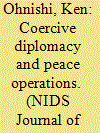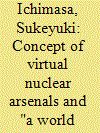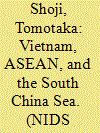|
|
|
Sort Order |
|
|
|
Items / Page
|
|
|
|
|
|
|
| Srl | Item |
| 1 |
ID:
122602


|
|
|
|
|
| Publication |
2012.
|
| Summary/Abstract |
This paper analyzes the activities of the International Force for East Timor (INTERFET) from the
perspectives of compellence and coercive diplomacy with the recognition that the proactive use of
force is also effective in peace operations and the appropriate concept underpinning such actions is
coercion, particularly compellence and coercive diplomacy. After a referendum on independence
from Indonesia in August 1999, East Timor was thrown into confusion by large-scale destruction
and forced displacement of residents by anti-independence militias. INTERFET that intervened to
restore security to East Timor used its military force to proactively put pressure on militias and
part of Indonesian troops to induce them to alter their actions. These behaviors of INTERFET can
be captured in line with the structure of coercive diplomacy and INTERFET's high-level military
capability and the existence of its clear objectives can be cited as factors contributing to its success.
As suggestions for peace operations in general, it can be pointed out that coercion by denial, rather
than by punishment, seems to be more effective in the context of peace operations and that it is
necessary to practice threats of denial across all areas of operations.
|
|
|
|
|
|
|
|
|
|
|
|
|
|
|
|
| 2 |
ID:
122600


|
|
|
|
|
| Publication |
2012.
|
| Summary/Abstract |
Proposed by J. Schell and others in the Cold War era, the concept of virtual nuclear arsenals has been
a subject of debate. From the standpoint of the theory of nuclear disarmament, the concept has been
questioned on the basis of justifying the nuclear threat, infringing on the irreversibility requirement of
disarmament, and fixating the discriminatory structure of nuclear weapons. On the other hand, from
the viewpoint of the theory of nuclear deterrence, the problem of instability and feasibility inherent in
the concept and the idea of reconstructing nuclear arsenals that will decrease second strike capability
have been under harsh criticisms. Attempting to find new inter-linkages between the debates of
nuclear disarmament and deterrence theories over the vision of "a world without nuclear weapons"
proposed by the US Obama administration, this study sets out to examine the implications that the
concept of virtual nuclear arsenals may have on the current international security environment from
the two aspects of: nuclear deterrence and disarmament; and nuclear non-proliferation.
|
|
|
|
|
|
|
|
|
|
|
|
|
|
|
|
| 3 |
ID:
122601


|
|
|
|
|
| Publication |
2012.
|
| Summary/Abstract |
Since the adoption of an action plan at the Sea Island Summit in 2004, the Group of Eight (G8) has
addressed the issue of global peacekeeping capacity-building. This peacekeeping capacity-building
assistance agenda includes military, police and civilian aspects of peacekeeping, and aims at the
development of a comprehensive range of peacekeeping capabilities worldwide. The G8 initiatives
have produced some positive results for those nations receiving assistance. However, on the other
hand, the G8 members' actual assistance programs have placed an emphasis on the training of military
peacekeepers at the cost of some other areas, including logistic and financial assistance, which have
not received sufficient attention.
Unlike the United Nations (UN), the G8 is not an operational actor in peacekeeping. However,
from a diplomatic perspective, the G8, like the UN, is a global actor while being unique in that it has
a more flexible organizational structure and agenda-setting capacity. The G8 can play a significant
role in global peacekeeping by mobilizing and legitimizing international assistance to global actors
and governments engaged in peacekeeping as well as peacekeeping capacity-building. As a founding
member of the G8, Japan is expected to actively draw linkages with the G8's peacekeeping capacitybuilding agenda with its own peacekeeping policy and to take the initiative in further developing the
G8 agenda.
|
|
|
|
|
|
|
|
|
|
|
|
|
|
|
|
| 4 |
ID:
122599


|
|
|
|
|
| Publication |
2012.
|
| Summary/Abstract |
Against the backdrop of China's growing assertiveness on sovereign and strategic interests in the
South China Sea, territorial disputes in this resource-rich sea area have re-emerged among the
claimants, including some ASEAN members. Vietnam in particular has been increasingly concerned
about China's expanding physical presence and assertive, sometimes aggressive, actions to manage
natural resources. Vietnam strives to check China's rise not by "containing" the country using military
options, but to place the issue on the agenda of ASEAN-centered multilateral dialogue frameworks
and achieve a breakthrough by making use of the collective diplomatic power of ASEAN, and as
appropriate, the engagement of countries outside of the region. Furthermore, Vietnam endeavors to
strengthen its hedging against the rise of China by carefully forging closer ties with the US. The
Philippines, too, increasingly views China's movements with caution, and is reinforcing its ASEANcentered diplomatic activities as well as promoting security cooperation with the US. In contrast,
Malaysia has not made any notable moves other than modernizing its naval capabilities. Indonesia,
as the ASEAN Chair in 2011, was proactive in conducting multilateral talks by hosting a series of
ASEAN-related meetings. ASEAN members are expected to continue to pursue multi-dimensional
diplomacy toward the peaceful settlement of disputes. The challenge will be how ASEAN will be able
to maintain its unity.
|
|
|
|
|
|
|
|
|
|
|
|
|
|
|
|
|
|
|
|
|